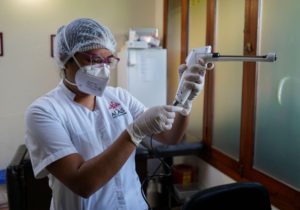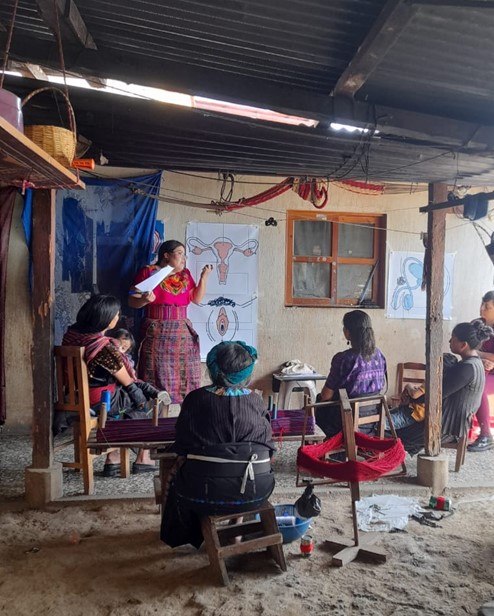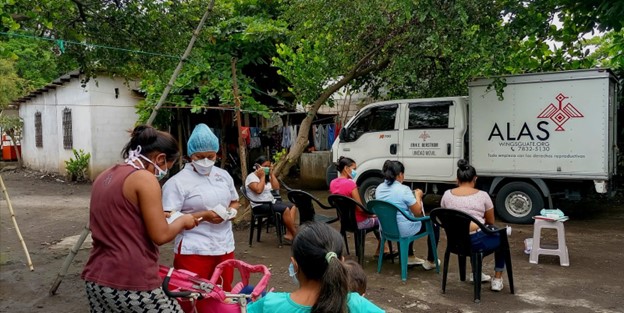Reaching the unreachable with reproductive healthcare: Q&A with WINGS
Written by Olivia Nater | Published: January 24, 2023
Through our Global Partners program, Population Connection supports a growing number of grassroots organizations around the world working to increase access to education, public health and family planning services. Their efforts make a vital difference in their local communities and represent the “final step” in our shared work to make the world a more just and sustainable place for everyone.
Get to know our wonderful partners in this Q&A series! Development & Communications Director Kirsten Taylor tells us about her organization WINGS (Women’s International Network for Guatemala Solutions), a non-profit founded in 2001 to help rural Guatemalans access reproductive and sexual health services and education.
What prompted your founder to start your organization?
WINGS Founder, Sue Patterson, discovered her passion for helping women as a Peace Corps volunteer in a rural area of Colombia from 1966 to 1968, helping them learn about family planning and how to access it. Sue has lived in Antigua, Guatemala, since 1996, when she retired from a 24-year career as a U.S. Foreign Service Officer. Since then, Sue has devoted her time and energy to improving the lives of underserved Guatemalans, especially Mayan women in rural areas, without access to education.
In 1999, a Guatemalan friend contacted Sue asking for help for seven women, all with at least eight children, who wanted to undergo a tubal ligation. Sue contributed from her own funds and wrote to friends asking for donations. Within a few months she had received more than $4,000. She discovered there was no non-profit organization focused on family planning in Guatemala, and that led her to found WINGS. Sue continues to be an active member of the WINGS Board and has contributed fundamentally to the growth of the organization.
What programs or projects are you currently working on?
Working in 16 predominantly rural, indigenous, and underserved departments (like states or provinces) in Guatemala, we collaborate with local partners to implement the following activities:
REPRODUCTIVE HEALTH CLINICS

Our mobile units which reach rural communities, as well as our stationary clinics, provide long-acting reversible contraception, short-acting contraceptives, and rapid cervical cancer screening/treatment. We offer copper IUDs which provide up to 10 years of protection from unintended pregnancies and subdermal hormonal implants which provide 5 years of protection. We use visual inspection with acetic acid for immediate detection of cervical cell abnormalities and same-day treatment using thermocoagulation for pre-cancerous cells that may lead to cervical cancer.
MOBILE SURGICAL CLINICS
Affordable, quality tubal ligations and vasectomies are performed by our Medical Director, staff surgeon, and contracted physicians at partner hospitals in Alta Verapaz, Baja Verapaz, Chimaltenango, Escuintla, Guatemala, Huehuetenango, Izabal, Quetzaltenango, Quiché, Retalhuleu, San Marcos, Santa Rosa, Sololá, Suchitepéquez, and Totonicapán. Our nurses provide pre and post procedure care as well as follow-up in the days after the procedures.
YOUTH PEER EDUCATION PROGRAM
Young women and men (ages 13 to 19) trained as Youth Leaders provide accurate reproductive health information and service referrals to their peers through community-based activities. Our evidence-based training curriculum uses an educational strategy that addresses gender and power in intimate relationships, with a focus on pregnancy prevention for adolescents.
VOLUNTEER PROMOTER NETWORK

One of WINGS’ longest-standing programs is our network of 27 Volunteer Health Promoters: community leaders identified within underserved rural areas to be a local point of service. Through their intimate linguistic and cultural knowledge of the communities they serve, they are able to provide quality contraceptive counseling, low-cost short-acting methods, and referrals to WINGS medical clinics for additional services.
COMMUNITY ADVISORY BOARD
Our two Community Advisory Boards — one located in the department of Sacatepéquez and the other in Alta Verapaz — serve as avenues to ensure the meaningful inclusion of community voices in our organizational decision-making processes. These groups provide insight into their communities’ needs and perceptions of our services, help us troubleshoot difficulties our programs may be facing, shape the vision for future programming, and help us evaluate our current activities. The groups’ purpose is one of internal advising of the WINGS team, rather than of a public-facing advocacy group.
What do you hope to achieve in the next five years?
WINGS is currently implementing our visionary strategic plan, called WINGS 2025, in which we will have service provision presence in all 22 departments of Guatemala by the end of 2025.
What have been some of the greatest challenges you have faced?
In the last five years, we have gained incredible momentum in bringing our services to communities across Guatemala. We established strategic partners and proved ourselves as a high-quality and reliable partner and service provider. This, combined with the extreme need for reproductive health services throughout the country, has enabled us to grow quickly. However, it has also meant growing responsibly, maintaining the culture that makes WINGS different, and investing in the preparation needed to enter new departments with great care. To that end, we have hired a researcher who investigates each department to establish partnerships and understand the local context before we launch new activities. We also continue to invest heavily in our staff development and in effective, empathetic leadership throughout our organization. Finally, we have established a Monitoring & Evaluation department to keep up with the continuous learning required to live out our vision — a future where all Guatemalans thrive and are able to fully exercise their sexual and reproductive rights.
What are you most proud of?
Out of our 80 employees, 76 are Guatemalan (95%), including all of our medical and field staff. We take great pride in having a team that reflects the communities that we serve and recognize this fact as a critical pillar of our success.
To learn more about WINGS, visit their website, and follow them on Facebook, Twitter and Instagram!

